Clinical Governance Failure and Implications: Bundaberg Hospital
VerifiedAdded on 2023/06/07
|6
|1349
|395
Report
AI Summary
This report delves into the corporate governance failure at Bundaberg Hospital, Queensland, focusing on the negligence and irresponsibility surrounding the appointment and actions of Dr. Jayant Patel. The investigation revealed failures in administrative oversight, inadequate verification of credentials, and a disregard for patient complaints, leading to patient deaths and compromised care. The report highlights the importance of ethical values and decision-making processes within the hospital's organizational culture to prevent similar failures in the future. It emphasizes the need for robust governance mechanisms, including stringent credentialing processes and ethical considerations, to ensure patient safety and maintain the integrity of healthcare services. The analysis suggests implementing a value congruence model to bridge the gap between employee and patient values, thereby fostering a healthier and more ethical environment within the hospital.
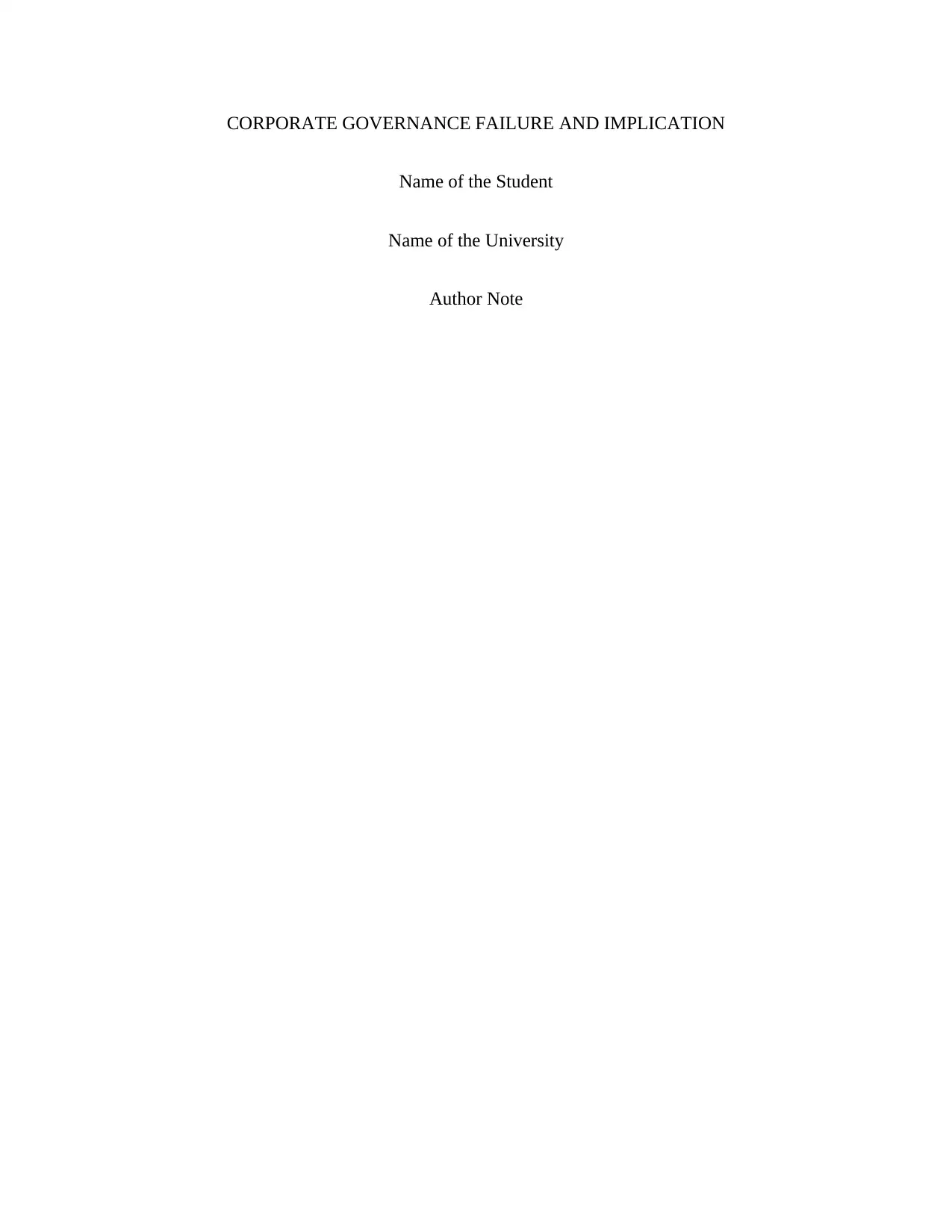
CORPORATE GOVERNANCE FAILURE AND IMPLICATION
Name of the Student
Name of the University
Author Note
Name of the Student
Name of the University
Author Note
Paraphrase This Document
Need a fresh take? Get an instant paraphrase of this document with our AI Paraphraser
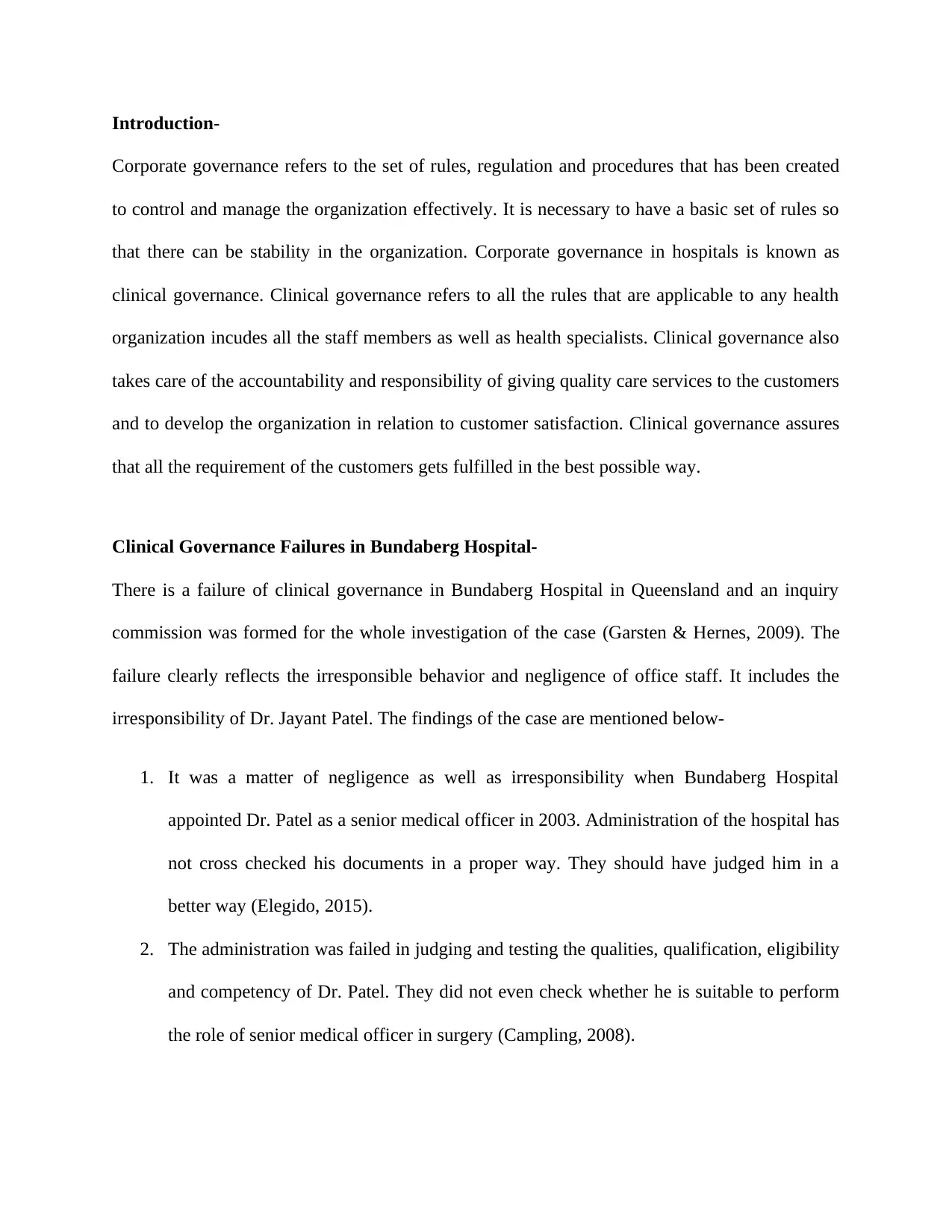
Introduction-
Corporate governance refers to the set of rules, regulation and procedures that has been created
to control and manage the organization effectively. It is necessary to have a basic set of rules so
that there can be stability in the organization. Corporate governance in hospitals is known as
clinical governance. Clinical governance refers to all the rules that are applicable to any health
organization incudes all the staff members as well as health specialists. Clinical governance also
takes care of the accountability and responsibility of giving quality care services to the customers
and to develop the organization in relation to customer satisfaction. Clinical governance assures
that all the requirement of the customers gets fulfilled in the best possible way.
Clinical Governance Failures in Bundaberg Hospital-
There is a failure of clinical governance in Bundaberg Hospital in Queensland and an inquiry
commission was formed for the whole investigation of the case (Garsten & Hernes, 2009). The
failure clearly reflects the irresponsible behavior and negligence of office staff. It includes the
irresponsibility of Dr. Jayant Patel. The findings of the case are mentioned below-
1. It was a matter of negligence as well as irresponsibility when Bundaberg Hospital
appointed Dr. Patel as a senior medical officer in 2003. Administration of the hospital has
not cross checked his documents in a proper way. They should have judged him in a
better way (Elegido, 2015).
2. The administration was failed in judging and testing the qualities, qualification, eligibility
and competency of Dr. Patel. They did not even check whether he is suitable to perform
the role of senior medical officer in surgery (Campling, 2008).
Corporate governance refers to the set of rules, regulation and procedures that has been created
to control and manage the organization effectively. It is necessary to have a basic set of rules so
that there can be stability in the organization. Corporate governance in hospitals is known as
clinical governance. Clinical governance refers to all the rules that are applicable to any health
organization incudes all the staff members as well as health specialists. Clinical governance also
takes care of the accountability and responsibility of giving quality care services to the customers
and to develop the organization in relation to customer satisfaction. Clinical governance assures
that all the requirement of the customers gets fulfilled in the best possible way.
Clinical Governance Failures in Bundaberg Hospital-
There is a failure of clinical governance in Bundaberg Hospital in Queensland and an inquiry
commission was formed for the whole investigation of the case (Garsten & Hernes, 2009). The
failure clearly reflects the irresponsible behavior and negligence of office staff. It includes the
irresponsibility of Dr. Jayant Patel. The findings of the case are mentioned below-
1. It was a matter of negligence as well as irresponsibility when Bundaberg Hospital
appointed Dr. Patel as a senior medical officer in 2003. Administration of the hospital has
not cross checked his documents in a proper way. They should have judged him in a
better way (Elegido, 2015).
2. The administration was failed in judging and testing the qualities, qualification, eligibility
and competency of Dr. Patel. They did not even check whether he is suitable to perform
the role of senior medical officer in surgery (Campling, 2008).
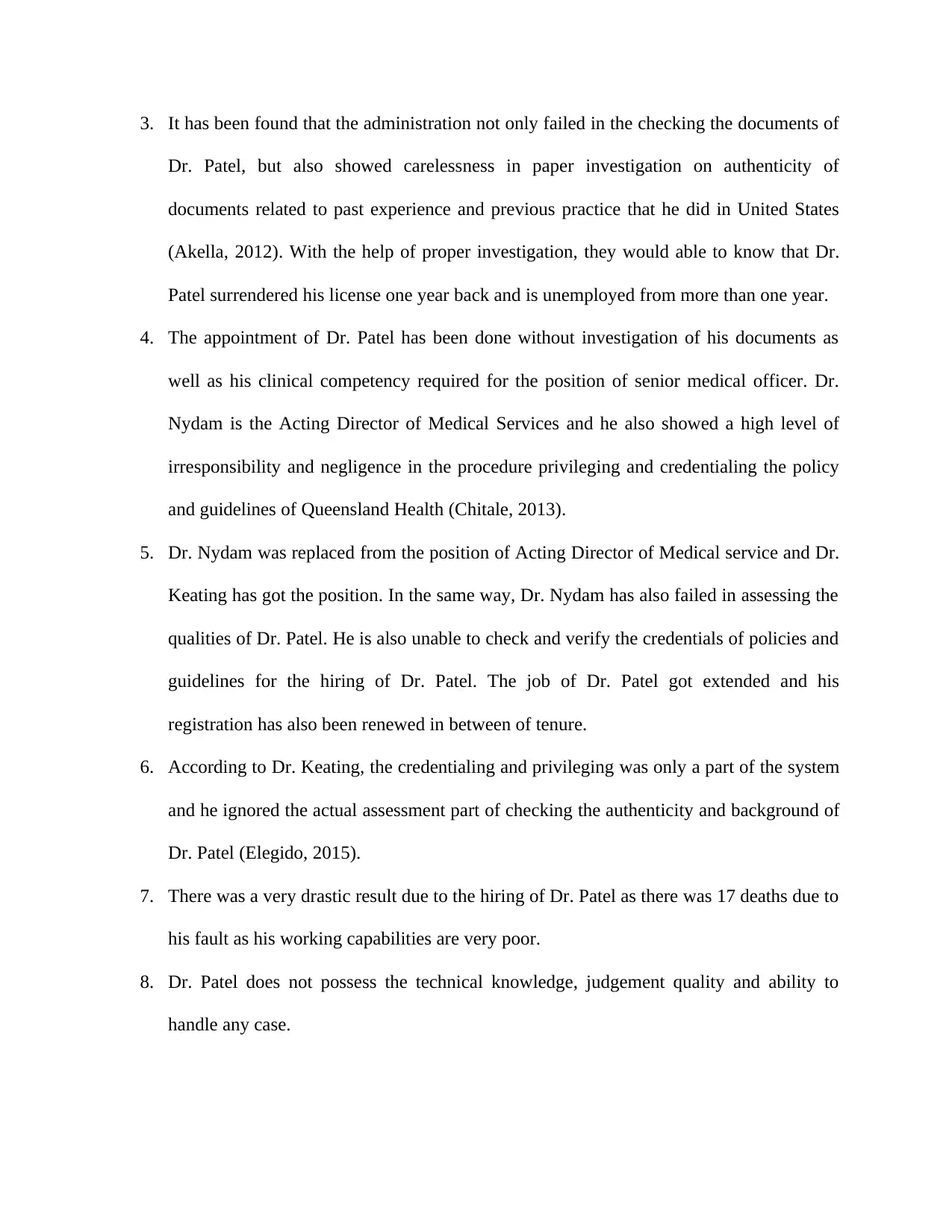
3. It has been found that the administration not only failed in the checking the documents of
Dr. Patel, but also showed carelessness in paper investigation on authenticity of
documents related to past experience and previous practice that he did in United States
(Akella, 2012). With the help of proper investigation, they would able to know that Dr.
Patel surrendered his license one year back and is unemployed from more than one year.
4. The appointment of Dr. Patel has been done without investigation of his documents as
well as his clinical competency required for the position of senior medical officer. Dr.
Nydam is the Acting Director of Medical Services and he also showed a high level of
irresponsibility and negligence in the procedure privileging and credentialing the policy
and guidelines of Queensland Health (Chitale, 2013).
5. Dr. Nydam was replaced from the position of Acting Director of Medical service and Dr.
Keating has got the position. In the same way, Dr. Nydam has also failed in assessing the
qualities of Dr. Patel. He is also unable to check and verify the credentials of policies and
guidelines for the hiring of Dr. Patel. The job of Dr. Patel got extended and his
registration has also been renewed in between of tenure.
6. According to Dr. Keating, the credentialing and privileging was only a part of the system
and he ignored the actual assessment part of checking the authenticity and background of
Dr. Patel (Elegido, 2015).
7. There was a very drastic result due to the hiring of Dr. Patel as there was 17 deaths due to
his fault as his working capabilities are very poor.
8. Dr. Patel does not possess the technical knowledge, judgement quality and ability to
handle any case.
Dr. Patel, but also showed carelessness in paper investigation on authenticity of
documents related to past experience and previous practice that he did in United States
(Akella, 2012). With the help of proper investigation, they would able to know that Dr.
Patel surrendered his license one year back and is unemployed from more than one year.
4. The appointment of Dr. Patel has been done without investigation of his documents as
well as his clinical competency required for the position of senior medical officer. Dr.
Nydam is the Acting Director of Medical Services and he also showed a high level of
irresponsibility and negligence in the procedure privileging and credentialing the policy
and guidelines of Queensland Health (Chitale, 2013).
5. Dr. Nydam was replaced from the position of Acting Director of Medical service and Dr.
Keating has got the position. In the same way, Dr. Nydam has also failed in assessing the
qualities of Dr. Patel. He is also unable to check and verify the credentials of policies and
guidelines for the hiring of Dr. Patel. The job of Dr. Patel got extended and his
registration has also been renewed in between of tenure.
6. According to Dr. Keating, the credentialing and privileging was only a part of the system
and he ignored the actual assessment part of checking the authenticity and background of
Dr. Patel (Elegido, 2015).
7. There was a very drastic result due to the hiring of Dr. Patel as there was 17 deaths due to
his fault as his working capabilities are very poor.
8. Dr. Patel does not possess the technical knowledge, judgement quality and ability to
handle any case.
⊘ This is a preview!⊘
Do you want full access?
Subscribe today to unlock all pages.

Trusted by 1+ million students worldwide
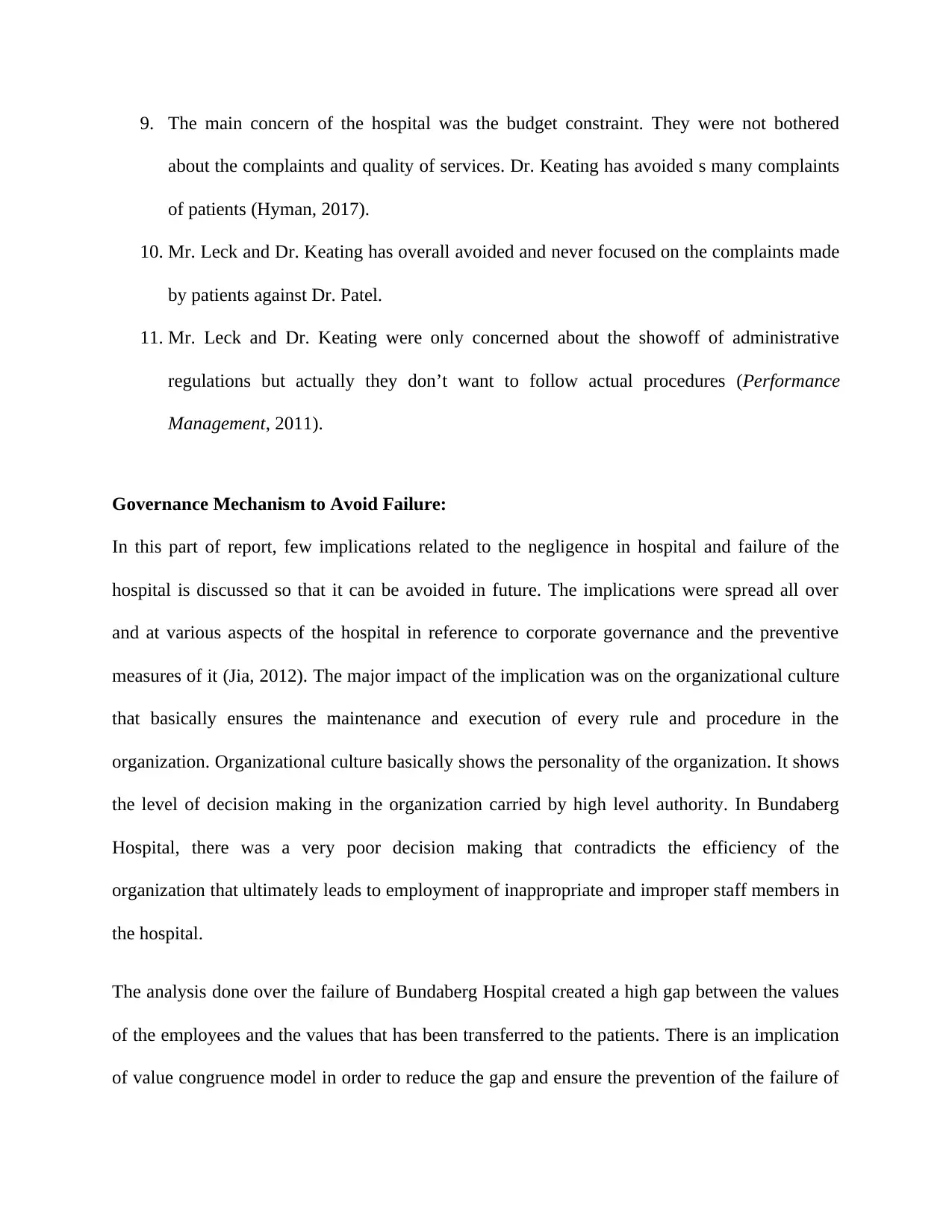
9. The main concern of the hospital was the budget constraint. They were not bothered
about the complaints and quality of services. Dr. Keating has avoided s many complaints
of patients (Hyman, 2017).
10. Mr. Leck and Dr. Keating has overall avoided and never focused on the complaints made
by patients against Dr. Patel.
11. Mr. Leck and Dr. Keating were only concerned about the showoff of administrative
regulations but actually they don’t want to follow actual procedures (Performance
Management, 2011).
Governance Mechanism to Avoid Failure:
In this part of report, few implications related to the negligence in hospital and failure of the
hospital is discussed so that it can be avoided in future. The implications were spread all over
and at various aspects of the hospital in reference to corporate governance and the preventive
measures of it (Jia, 2012). The major impact of the implication was on the organizational culture
that basically ensures the maintenance and execution of every rule and procedure in the
organization. Organizational culture basically shows the personality of the organization. It shows
the level of decision making in the organization carried by high level authority. In Bundaberg
Hospital, there was a very poor decision making that contradicts the efficiency of the
organization that ultimately leads to employment of inappropriate and improper staff members in
the hospital.
The analysis done over the failure of Bundaberg Hospital created a high gap between the values
of the employees and the values that has been transferred to the patients. There is an implication
of value congruence model in order to reduce the gap and ensure the prevention of the failure of
about the complaints and quality of services. Dr. Keating has avoided s many complaints
of patients (Hyman, 2017).
10. Mr. Leck and Dr. Keating has overall avoided and never focused on the complaints made
by patients against Dr. Patel.
11. Mr. Leck and Dr. Keating were only concerned about the showoff of administrative
regulations but actually they don’t want to follow actual procedures (Performance
Management, 2011).
Governance Mechanism to Avoid Failure:
In this part of report, few implications related to the negligence in hospital and failure of the
hospital is discussed so that it can be avoided in future. The implications were spread all over
and at various aspects of the hospital in reference to corporate governance and the preventive
measures of it (Jia, 2012). The major impact of the implication was on the organizational culture
that basically ensures the maintenance and execution of every rule and procedure in the
organization. Organizational culture basically shows the personality of the organization. It shows
the level of decision making in the organization carried by high level authority. In Bundaberg
Hospital, there was a very poor decision making that contradicts the efficiency of the
organization that ultimately leads to employment of inappropriate and improper staff members in
the hospital.
The analysis done over the failure of Bundaberg Hospital created a high gap between the values
of the employees and the values that has been transferred to the patients. There is an implication
of value congruence model in order to reduce the gap and ensure the prevention of the failure of
Paraphrase This Document
Need a fresh take? Get an instant paraphrase of this document with our AI Paraphraser
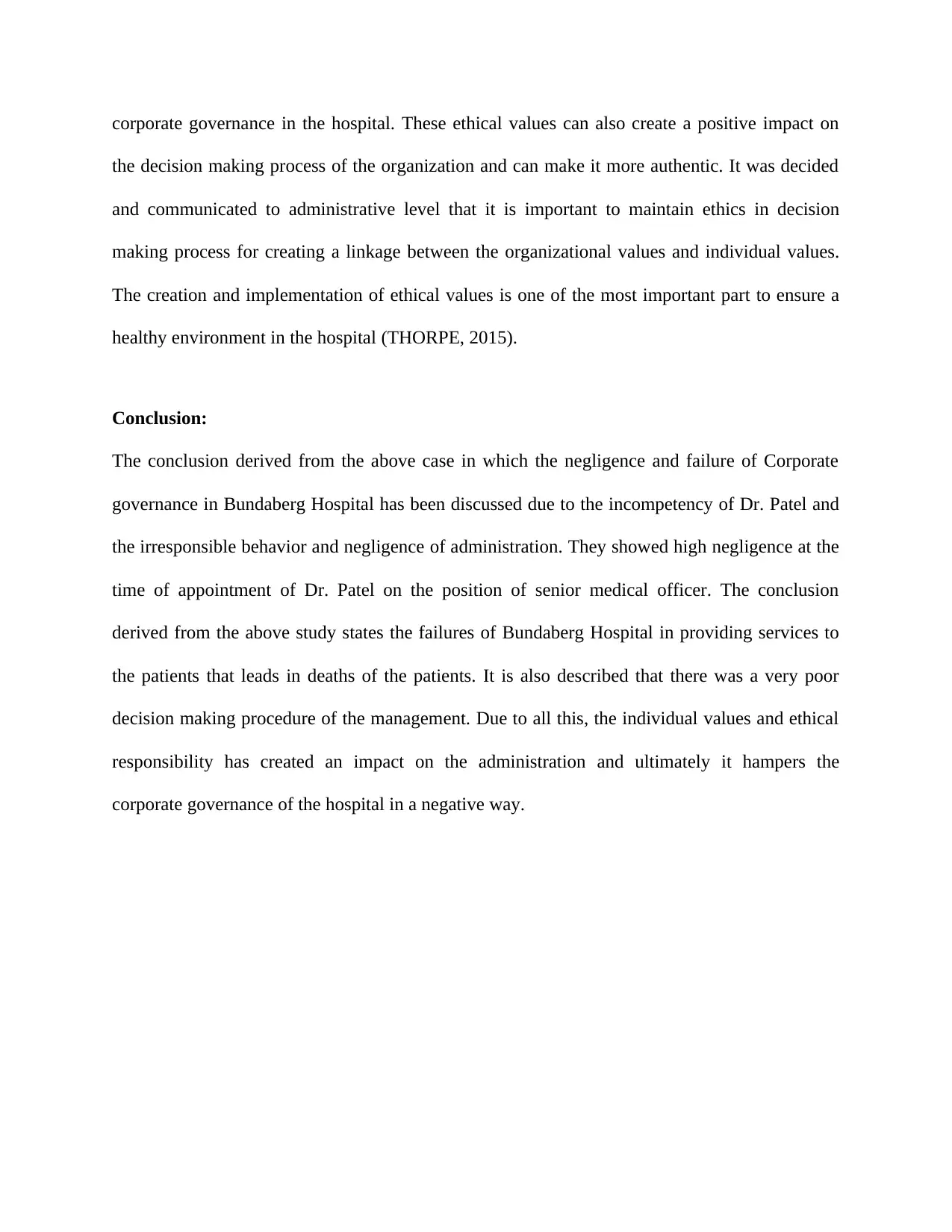
corporate governance in the hospital. These ethical values can also create a positive impact on
the decision making process of the organization and can make it more authentic. It was decided
and communicated to administrative level that it is important to maintain ethics in decision
making process for creating a linkage between the organizational values and individual values.
The creation and implementation of ethical values is one of the most important part to ensure a
healthy environment in the hospital (THORPE, 2015).
Conclusion:
The conclusion derived from the above case in which the negligence and failure of Corporate
governance in Bundaberg Hospital has been discussed due to the incompetency of Dr. Patel and
the irresponsible behavior and negligence of administration. They showed high negligence at the
time of appointment of Dr. Patel on the position of senior medical officer. The conclusion
derived from the above study states the failures of Bundaberg Hospital in providing services to
the patients that leads in deaths of the patients. It is also described that there was a very poor
decision making procedure of the management. Due to all this, the individual values and ethical
responsibility has created an impact on the administration and ultimately it hampers the
corporate governance of the hospital in a negative way.
the decision making process of the organization and can make it more authentic. It was decided
and communicated to administrative level that it is important to maintain ethics in decision
making process for creating a linkage between the organizational values and individual values.
The creation and implementation of ethical values is one of the most important part to ensure a
healthy environment in the hospital (THORPE, 2015).
Conclusion:
The conclusion derived from the above case in which the negligence and failure of Corporate
governance in Bundaberg Hospital has been discussed due to the incompetency of Dr. Patel and
the irresponsible behavior and negligence of administration. They showed high negligence at the
time of appointment of Dr. Patel on the position of senior medical officer. The conclusion
derived from the above study states the failures of Bundaberg Hospital in providing services to
the patients that leads in deaths of the patients. It is also described that there was a very poor
decision making procedure of the management. Due to all this, the individual values and ethical
responsibility has created an impact on the administration and ultimately it hampers the
corporate governance of the hospital in a negative way.
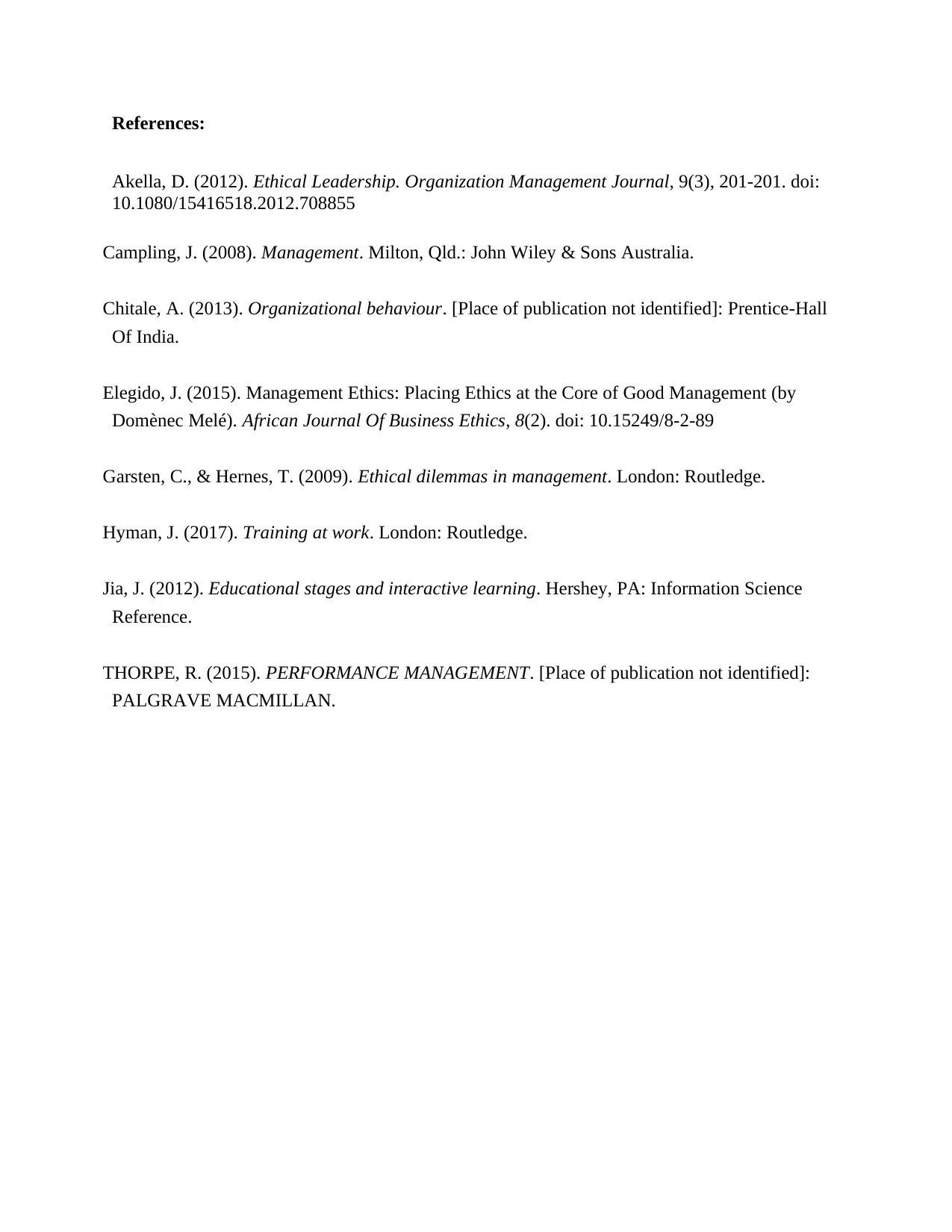
References:
Akella, D. (2012). Ethical Leadership. Organization Management Journal, 9(3), 201-201. doi:
10.1080/15416518.2012.708855
Campling, J. (2008). Management. Milton, Qld.: John Wiley & Sons Australia.
Chitale, A. (2013). Organizational behaviour. [Place of publication not identified]: Prentice-Hall
Of India.
Elegido, J. (2015). Management Ethics: Placing Ethics at the Core of Good Management (by
Domènec Melé). African Journal Of Business Ethics, 8(2). doi: 10.15249/8-2-89
Garsten, C., & Hernes, T. (2009). Ethical dilemmas in management. London: Routledge.
Hyman, J. (2017). Training at work. London: Routledge.
Jia, J. (2012). Educational stages and interactive learning. Hershey, PA: Information Science
Reference.
THORPE, R. (2015). PERFORMANCE MANAGEMENT. [Place of publication not identified]:
PALGRAVE MACMILLAN.
Akella, D. (2012). Ethical Leadership. Organization Management Journal, 9(3), 201-201. doi:
10.1080/15416518.2012.708855
Campling, J. (2008). Management. Milton, Qld.: John Wiley & Sons Australia.
Chitale, A. (2013). Organizational behaviour. [Place of publication not identified]: Prentice-Hall
Of India.
Elegido, J. (2015). Management Ethics: Placing Ethics at the Core of Good Management (by
Domènec Melé). African Journal Of Business Ethics, 8(2). doi: 10.15249/8-2-89
Garsten, C., & Hernes, T. (2009). Ethical dilemmas in management. London: Routledge.
Hyman, J. (2017). Training at work. London: Routledge.
Jia, J. (2012). Educational stages and interactive learning. Hershey, PA: Information Science
Reference.
THORPE, R. (2015). PERFORMANCE MANAGEMENT. [Place of publication not identified]:
PALGRAVE MACMILLAN.
⊘ This is a preview!⊘
Do you want full access?
Subscribe today to unlock all pages.

Trusted by 1+ million students worldwide
1 out of 6
Related Documents
Your All-in-One AI-Powered Toolkit for Academic Success.
+13062052269
info@desklib.com
Available 24*7 on WhatsApp / Email
![[object Object]](/_next/static/media/star-bottom.7253800d.svg)
Unlock your academic potential
Copyright © 2020–2026 A2Z Services. All Rights Reserved. Developed and managed by ZUCOL.





